
Natural Computing
Scope & Guideline
Advancing Knowledge in Nature-Inspired Algorithms
Introduction
Aims and Scopes
- Computational Models Inspired by Nature:
The journal explores a wide array of computational models that draw inspiration from biological processes, such as cellular automata, spiking neural networks, and reaction-diffusion systems. - Algorithm Development and Optimization:
Natural Computing features research focused on developing new algorithms, particularly those that are nature-inspired, for solving complex optimization problems across various domains. - Theoretical Foundations of Natural Computing:
Research published in the journal often delves into the theoretical aspects of natural computing, including complexity analysis and the computational power of different models. - Applications of Natural Computing:
The journal includes studies that apply natural computing techniques to real-world problems, such as optimization in logistics, bioinformatics, and autonomous systems. - Interdisciplinary Approaches:
Natural Computing promotes interdisciplinary research that combines insights from computer science, biology, physics, and engineering to enhance computational methodologies.
Trending and Emerging
- Integration of Machine Learning with Natural Computing:
The convergence of machine learning techniques with natural computing methods is gaining momentum, reflecting the demand for more adaptive and intelligent systems. - Dynamic and Adaptive Systems:
Research into dynamic systems that can adapt to changing environments is on the rise, highlighting the need for algorithms that can operate effectively in real-time contexts. - Hybrid Computational Models:
There is an increasing trend toward developing hybrid models that combine elements from various computational paradigms, such as genetic algorithms with neural networks or cellular automata. - Bioinformatics and Computational Biology Applications:
The application of natural computing methodologies in bioinformatics and computational biology is expanding, driven by the need to solve complex biological problems. - Advanced Reaction Systems and Molecular Computing:
Recent publications indicate a growing interest in reaction systems and molecular computing, exploring their potential for solving computational problems and modeling biological processes.
Declining or Waning
- Classical Evolutionary Algorithms:
There has been a decline in publications focused solely on classical evolutionary algorithms, as researchers increasingly explore hybrid approaches or integrate machine learning techniques. - Basic Cellular Automata Studies:
Research centered on basic cellular automata without novel applications or theoretical advancements appears to be decreasing, potentially due to saturation in this area. - Static Optimization Problems:
The focus on static optimization problems has decreased in favor of dynamic or adaptive optimization scenarios, reflecting a shift towards more complex real-world challenges. - Traditional Genetic Algorithms:
While genetic algorithms remain relevant, the focus on traditional implementations without enhancements or adaptations is less pronounced, as new methodologies gain traction. - Single-Objective Optimization:
There is a noticeable reduction in studies addressing single-objective optimization problems, with an increasing emphasis on multi-objective and complex problem-solving.
Similar Journals
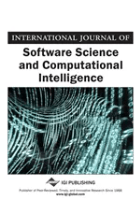
International Journal of Software Science and Computational Intelligence-IJSSCI
Fostering Innovation in Computational IntelligenceInternational Journal of Software Science and Computational Intelligence (IJSSCI) is a prominent academic journal published by IGI Global, dedicated to advancing the fields of software science and computational intelligence. With its ISSN 1942-9045 and E-ISSN 1942-9037, IJSSCI offers a platform for researchers, practitioners, and students to disseminate innovative research findings, theoretical advancements, and practical applications in areas such as algorithm development, machine learning, and software engineering. Although the journal currently does not operate under an open access model, its rigorous peer-review process ensures high-quality publications that contribute significantly to the academic discourse. Based in Hershey, PA, IJSSCI is recognized for its commitment to fostering collaboration among professionals in the technology and computer science fields, making it an essential resource for those looking to stay at the forefront of software science advancements.
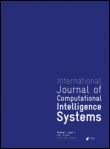
International Journal of Computational Intelligence Systems
Advancing Knowledge in Computational IntelligenceInternational Journal of Computational Intelligence Systems, published by SPRINGERNATURE, is a leading open-access journal that has been at the forefront of research in the field of computational intelligence since 2008. With an ISSN of 1875-6891 and an E-ISSN of 1875-6883, this journal occupies a prominent place in the academic landscape, achieving impressive rankings in its categories: Q2 in both Computational Mathematics and Computer Science (miscellaneous), reflecting its significance and relevance to researchers, professionals, and students. Based in Switzerland, the journal is committed to disseminating high-quality research and fostering innovation in computational methodologies, algorithms, and applications. Its strong impact factor and Scopus rankings—31/189 in Computational Mathematics and 53/232 in General Computer Science—underscore its critical role in advancing knowledge in these interdisciplinary fields. As an open-access journal, it provides unparalleled accessibility to cutting-edge research, supporting the global community in staying at the forefront of computational intelligence advancements.
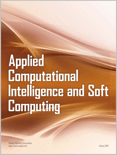
Applied Computational Intelligence and Soft Computing
Elevating Engineering with Computational InsightsApplied Computational Intelligence and Soft Computing, published by HINDAWI LTD, is a premier open access journal that has been disseminating critical research since 2009, focusing on the intersection of artificial intelligence and soft computing. With an impressive array of quartile rankings in 2023, including Q2 in Civil and Structural Engineering and Computational Mechanics, this journal has established itself as a significant contributor to the fields of computer science and engineering. Based in Egypt, it plays a vital role in advancing knowledge by providing researchers, professionals, and students with easy access to high-quality studies. The journal’s rigorous peer-review process ensures that only the most impactful research is highlighted, making it an essential resource for those looking to stay abreast of the latest innovations and methodological advancements in applied computational intelligence. Its Scopus rankings further affirm its influence and reputation within the academic community, exemplifying its commitment to facilitating collaboration and fostering intellectual discourse in various scientific domains.
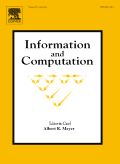
INFORMATION AND COMPUTATION
Transforming Ideas into Impactful SolutionsINFORMATION AND COMPUTATION is a peer-reviewed academic journal published by Academic Press Inc., Elsevier Science, dedicated to advancing the fields of computational theory and mathematics, computer science applications, and information systems. With an ISSN of 0890-5401 and an E-ISSN of 1090-2651, the journal provides a platform for innovative research that spans theoretical and applied perspectives. Acknowledged for its impact in the community, it holds a Q2 quartile ranking in several categories, including Computational Theory and Mathematics and Computer Science Applications, as of 2023. These rankings place it among the leading journals in its field, making it an essential resource for researchers, professionals, and students aiming to stay abreast of cutting-edge developments. While it does not currently offer Open Access options, the journal intends to foster scholarly communication and knowledge sharing from its inception in 1987 to its future issues expected through 2024. Located in the United States, at 525 B ST, STE 1900, SAN DIEGO, CA 92101-4495, INFORMATION AND COMPUTATION is committed to publishing high-quality research that influences the theoretical foundations and practical applications of its diverse disciplines.

Neuromorphic Computing and Engineering
Pioneering Research in Neuro-inspired ComputingNeuromorphic Computing and Engineering, published by IOP Publishing Ltd, stands as a premier open-access journal dedicated to the interdisciplinary field of neuromorphic computing, which integrates principles of artificial intelligence and hardware architecture. Launched in 2021, this journal plays a pivotal role in addressing the surge of research in intelligent systems mimicking neurobiological architectures, thus fostering innovation across various disciplines, including electrical and electronic engineering and materials science. With an impressive Q1 ranking across multiple categories in 2023, including Artificial Intelligence and Hardware and Architecture, it attracts a global audience eager to explore cutting-edge developments. The journal is positioned to deliver high-impact research, evident by its Scopus rankings—particularly its notable standing in Electrical and Electronic Engineering (Rank #217/797) and Electronic, Optical and Magnetic Materials (Rank #80/284). Neuromorphic Computing and Engineering not only contributes to the academic discourse but also provides an accessible platform for researchers, professionals, and students to disseminate and discuss their findings, reflecting the critical advancements in this rapidly evolving domain.
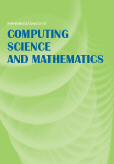
International Journal of Computing Science and Mathematics
Advancing Knowledge at the Intersection of Science and TechnologyThe International Journal of Computing Science and Mathematics, published by INDERSCIENCE ENTERPRISES LTD, is a pivotal platform for the dissemination of cutting-edge research in the intertwined disciplines of computing science and mathematics. With an ISSN of 1752-5055 and an E-ISSN of 1752-5063, the journal primarily serves the academic community engaged in applied mathematics, computational mathematics, theoretical computer science, and more, making significant contributions that resonate across various fields of technology and science. While the journal is currently categorized in the Q4 quartile for multiple related fields, including Applied Mathematics and Computational Theory, it continues to strive towards advancing the knowledge and practice within these areas. Spanning years from 2007 to 2010 and again from 2012 to 2024, the journal seeks to publish high-quality, peer-reviewed articles that not only address theoretical advancements but also explore practical applications of computing science in mathematical contexts, thereby fostering collaboration among researchers, professionals, and students alike. Please note that this journal is not available as Open Access, thus ensuring a curated content selection intended for dedicated research communities.

International Journal of Automation and Computing
Transforming Ideas into Solutions in AutomationInternational Journal of Automation and Computing, published by SPRINGERNATURE, is a premier academic journal dedicated to advancing knowledge in the fields of applied mathematics, computer science applications, control and systems engineering, and modeling and simulation. With an impressive impact factor and consistently ranked in the Q1 Quartile for its respective categories in 2023, the journal is recognized for its high-quality research and contributions to the automation and computing sectors. This journal provides open access to its articles, promoting the dissemination of innovative ideas and methodologies across a global audience. Based in China but serving an international community, the journal is key for researchers, professionals, and students looking to stay at the forefront of automation and computing technologies. Its rigorous peer-review process ensures that published works meet the highest scientific standards, making it an essential resource for those seeking to deepen their understanding and engage in cutting-edge research.

Journal of Cellular Automata
Advancing Knowledge in Complex SystemsWelcome to the Journal of Cellular Automata, an esteemed publication dedicated to advancing the understanding and application of cellular automata in various contexts. Published by OLD CITY PUBLISHING INC in the United States, this journal serves as a pivotal platform for researchers, professionals, and students in the fields of Computer Science and Control and Systems Engineering. Since its inception in 2008, the journal has provided a unique avenue for disseminating original research, reviews, and case studies that drive innovation in these interdisciplinary areas. Although it currently holds a Q4 ranking in Scopus for both Computer Science and Control and Systems Engineering categories, the journal aims to enhance its impact through rigorous peer review and the promotion of groundbreaking ideas. While access options do not include an open-access model, contributors and investigators can look forward to a vibrant exchange of knowledge dedicated to exploring the complexities and applications of cellular automata in various systems. Join us in our journey as we delve into the intricacies of this fascinating domain, contributing to the collective understanding and technological advancement within the scientific community.
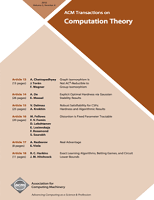
ACM Transactions on Computation Theory
Exploring the Foundations of Theoretical Computer Science.ACM Transactions on Computation Theory, published by the Association for Computing Machinery, is a prestigious journal dedicated to advancing the field of computation theory and theoretical computer science. With an ISSN of 1942-3454 and an E-ISSN of 1942-3462, this journal serves as a vital resource for researchers and professionals seeking to explore groundbreaking developments in computational models, algorithms, and their mathematical foundations. The journal's rigorous standards have earned it a significant position within the academic community, as evidenced by its 2023 category quartiles, ranking in the Q1 category for Computational Theory and Mathematics and Q2 for Theoretical Computer Science. Although it operates through traditional subscription access, it maintains a critical role in disseminating cutting-edge research and fostering collaboration among experts in the United States and beyond. As an influential platform, ACM Transactions on Computation Theory is committed to contributing to the ongoing dialogue and advancement of computation theory, making it essential reading for anyone passionate about this dynamic field.
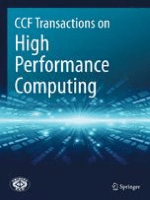
CCF Transactions on High Performance Computing
Advancing the Frontiers of High-Performance ComputingCCF Transactions on High Performance Computing, published by SPRINGERNATURE, is an esteemed academic journal dedicated to advancing research in the field of high-performance computing. With an ISSN of 2524-4922 and E-ISSN of 2524-4930, this journal provides a platform for disseminating innovative findings, methodologies, and technologies that shape computational practices within various domains. Operating from Germany, it serves a global audience, reinforcing its impact through an impressive categorization in the Q3 quartile across multiple fields, including Computer Science Applications and Information Systems. The journal, which covers research from 2019 to 2024, plays a crucial role in bridging gaps between theory and practical implementation in hardware architecture and software systems. Although it is not an open-access journal, its contributions are invaluable for researchers, professionals, and students invested in the continuous evolution of high-performance computing. With Scopus rankings that highlight its relevance and influence in the academic community, CCF Transactions on High Performance Computing remains a key resource for the latest developments in this dynamic and rapidly evolving discipline.